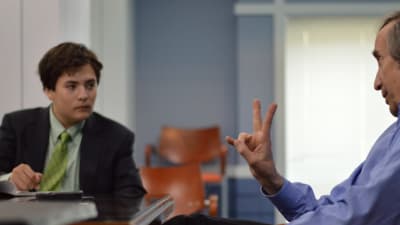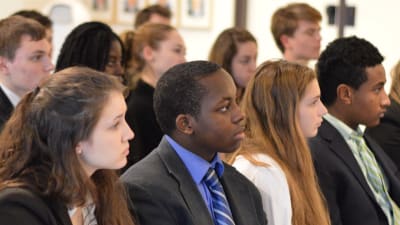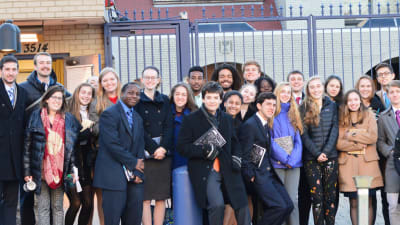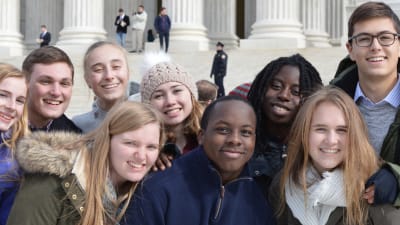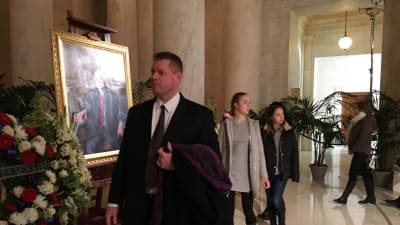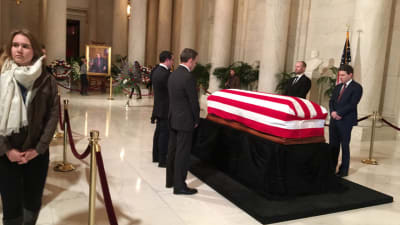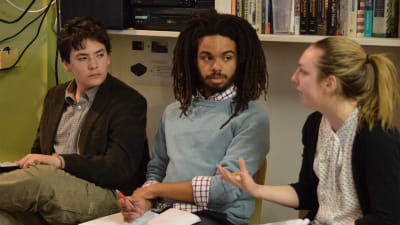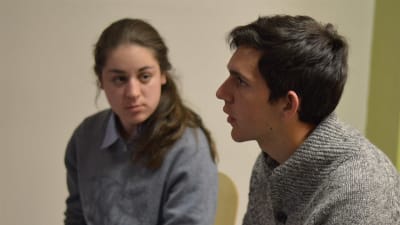Israelis, Palestinians, and Scalia
The Israeli-Palestinian Conflict is not only one of the most complicated challenges of our time; it influences countless related contemporary problems. Leaders of the past and present have worked to address it, with limited success. This week our team of emerging leaders took their turn, with hopeful results.
We began on Monday with a two-hour overview of the conflict. Stepping through the mine fields of loaded language and divergent narratives, we attempted to pin down key events and key negotiation sticking points (settlements, right of return, Jerusalem, etc.) and the various interpretations others have offered about them. The morning was filled with excellent questions and complex answers.
On Wednesday, we took a short Metro ride to the Woodrow Wilson Center and met with the experienced negotiator, advisor, and academic Aaron David Miller. Miller, who was at the table for the United States during the 2000 Camp David II negotiations and who has counseled six Secretaries of State, calls himself an “idealist without illusion” (after John F. Kennedy) and encouraged our students to consider that philosophy. He also shared his perspectives on the conflict and gave some of the reasons it appears more intractable than ever. Chief among those reasons: a decreasing ability to focus for long periods of time on an issue due to technology and social media, and a lack of empathy. His words exhorting our students to overcome those challenges were scribbled earnestly in two dozen notebooks.
On Thursday, we took another Metro ride up Connecticut Avenue to visit the Israeli Embassy. There the students got an insider’s view of the conflict from Jack Sztrigler, Director of Strategic Outreach and Galia Nurko, Director of National Media. The students left these visits with a deeper appreciation for the complexity of the situation, the effect of the conflict on the Israeli people and government, as well as a greater understanding of the role of international diplomats in promoting and bridging different points of view.
On Friday we met with Ghaith al-Omari, former Executive Director of the American Task Force on Palestine and current senior fellow at The Washington Institute for Near East Policy. Al-Omari, the 2015 SEGL Golden Mug Award winner, was at the table for the Palestinians during Camp David II and has served as Director of the International Relations Department in the Office of the Palestinian President, and advisor to Palestinian leader Mahmoud Abbas. His thoughts, delivered in the organized prose of an Oxford-educated lawyer (as he is), made students think as well. Is it better to curse setbacks in the peace process, or do setbacks only underscore the importance of staying engaged? What is the best way for college students to work on this issue?
The three points of view we heard this week are only three on a vibrant spectrum. These three perspectives, however, gave plenty of fodder for student conversation. How important is honoring opposing narratives in resolving conflict? Are negotiations the best strategy going, forward? If not, what is the best strategy? If so, how do we ensure they are successful? These are just a few of the topics our students proposed for reflection.
Meanwhile, the death of Supreme Court Justice Antonin Scalia dominated news coverage this week. Because of our residential location across the street from the Supreme Court, we had a front row view at mourners and protesters of all stripes. On Friday, at the request of students, we held morning classes in the residence in order to join the thousands lining up to pay tribute to the influential jurist, who lay in repose in the Supreme Court’s Great Hall. The experience was powerful and provocative, generating lots of reflection and conversation about Scalia’s impact, the way we honor the dead, the U.S. Presidential Election, and how we get along with each other despite our differing views. You can watch a short video clip of some students filing past Scalia’s casket via C-SPAN here (note that taking pictures was allowed, and that the four people standing by the casket are former Scalia law clerks). You can read a current student’s perspective on our visit here.
Next up: more Supreme Court intrigue as we tackle “affirmative action” and the landmark Fisher v. University of Texas case (to be re-argued this spring before the Court).



